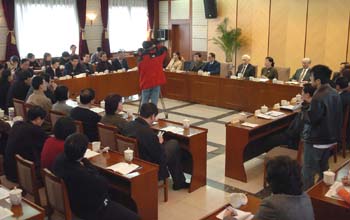| Tools: Save | Print | E-mail | Most Read |
| China Questions and Answers |
| Adjust font size: |
Q: At present, many people in the West think China practices a one-party system. Is this true? Why doesn't China adopt the same multi-party system as the Western countries, under which various political parties hold the state power by turn? A: That idea, as it were, is a misunderstanding. Governance in China is not a one-party system, but a multi-party cooperation and political consultation system under the leadership of the CPC. On the Chinese mainland, apart from the CPC, there are eight other political parties popularly known as "democratic parties," namely the Revolutionary Committee of the Chinese Kuomintang, China Democratic League, China Democratic National Construction Association, China Association for Promoting Democracy, China Peasants and Workers' Democratic Party, China Zhi Gong Dang, Jiu San Society and Taiwan Democratic Self-Government League. The present membership of these parties totals at least 600,000. As an ancient country with a civilization dating back more than 5,000 years, China puts great stock in its long-standing traditions. Meanwhile, far from being a conservative and closed nation, the Chinese are eager to learn from other countries and draw on their advanced culture and civilizations. For example, Marxism-Leninism, the guiding principle of the CPC, was introduced from other countries, and so was China's political party system. The first half of last century witnessed the collapse of both the multi-party system modeled on the West and the ensuing dictatorship imposed by a party in China. Foreigners often feel poorly accustomed to the Chinese lifestyle, and in the same vein, foreign political party systems can also prove unsuitable to China. We should therefore guard against replicating foreign one-party or multi-party models, while drawing on the advantages of foreign political party systems. Given this, and based on a review of lessons from history, the CPC and other political parties in China have decided on a typically Chinese multi-party cooperation and political consultation system led by the CPC in accordance with China's own realities, instead of resorting to other systems. All the other political parties in China support the CPC politically, a historical choice made during their long-term cooperation and collaborative struggle with the CPC. Sharing the same goal, the CPC and the other parties are all committed to the cause of building socialism with Chinese characteristics. Their cooperative relations are based on the principle of "long-term coexistence and mutual supervision, treating each other with full sincerity, and sharing weal or woe." In China's political system, the CPC is the party in power, whereas the eight non-communist parties participate in the discussion and management of state affairs. They take part in running the state, consultation on major political issues and choice of state leaders, management of state affairs, and deliberation and implementation of major policies, laws and regulations of the country. The CPC and the other parties all abide by the Constitution. The non-communist parties enjoy political freedom, organizational independence and legal equality in line with the rights and obligations prescribed by the Constitution. We believe that our political system demonstrates notable superiority and vitality as it can avoid the pitfalls of one-party dictatorship, most notably the lack of supervision, and the possible social turbulences in the wake of various rival parties jockeying for power. China's rapid development in recent years, especially since the advent of reform and opening up in the late 1970s, would have been impossible without the institutional backup provided by the political system.
|
| Tools: Save | Print | E-mail | Most Read |
 |
| Related Stories |
|
Product Directory China Search |
Country Search Hot Buys |
